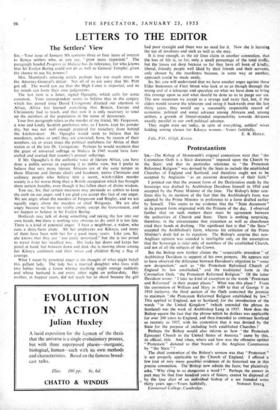Protestantism
Snt,—The Bishop of Monmouth's original contentions were that "the Coronation Oath is a Sta:e document" imposed upon the Church by the State; and that its particular reference to "the Protestant Reformed Religion" was devised by the State to include the established Churches of England and Scotland, and therefore ought not to be accepted by Anglicans "as an accurate description of their faith."
I pointed out that the present form of the Declaration made by the Sovereign was drafted by Archbishop Davidson himself in 1910 and accepted by the Prime Minister of the time. The Bishop's letter con- firms this by its mention of the fact that the Archbishop's form was adopted by the Prime Minister in preference to a form drafted earlier by himself. This seems to me evidence that the "State document" in its present form originated with the Primate of the day. I -observed further that on such matters there must be agreement between the authorities of Church and State. There is nothing surprising, therefore, in the circumstance that statesmen as well as churchmen tried their hands at drafting. • The significant fact is that "the State •' accepted the Archbishop's form, whereas his criticism- of the- Prime Minister's draft led to its rejection. The Bishop's surprise that non- Anglican opinion_ was sounded is intelligible only on the assumption that the Sovereign is ruler only of members of the established Church, and not of all the subjects of the Crown.
But the Bishop -now further claims the "respectable precedent " of Archbishop Davidson in support of his own protests. -He appears not to have observed the difference-between Davidson's objection to "some new designation," such as "the Protestant Reformed 'Church of England by law established," and the traditional form in the Coronafion Oath, "the Protestant Reformed Religion." Of the latter Davidson wrote: "I- take no kind of exception to the words 'Protestant and Reformed' in their proper places." What was this place ? From the coronation of William and Mary in .1689 to that of George V in 1910 inclusive, the third section of the Oath contained the promise to -maintain the Protestant Reformed Religion established by law." This applied to England, not to Scotland; for the introduction of the words "in the United Kingdom" (which extended the _phrase _to Scotland) was the work of Archbishop -Lang in 1937. How does the Bishop square the fact that the phrase iw,hich he dislikes was applicable for over 200 years to England, and then,4xtended to embrace Scotland so recently as 1937, with his contention that it was devised by the State for the purpose of including both established Churches ?
Perhaps the Bishop •would also inform us how "the Protestant Episcopal Church in the United States of America" came by this, its official, title. And when, where and how was the offensive 'epithet " Protestant " dictated to that "branch of the Anglican Communion by "the State " ?
The chief contention of the Bishop's sermon was that " Protestant " is not properly applicable to the Church of England: I offered a few (out of very many possible) evidences of its historical use in this precise connection. The Bishop now admits the facts; but plaintively asks, "Why cling to so dangerous a word ?" Perhaps the answer in part may be that four hundred years of history cannot be disposed of by the lose dixil of- an individual bishop of a see founded some thirty years ago.—Yours faithfully, NORMAN SYKE1. Emmanuel College, Cambridge.


































 Previous page
Previous page